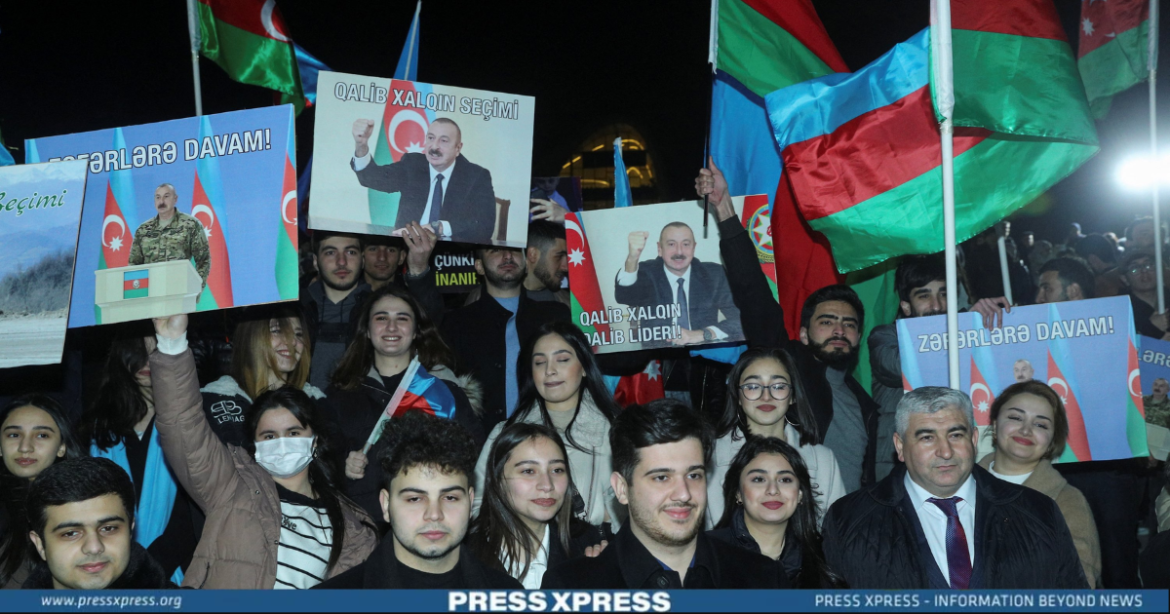Azerbaijan’s President Ilham Aliyev has secured a fifth consecutive term in office with a landslide victory in the snap election held on February 7. What this victory will mean for the region? Aliyev’s reelection will also have significant implications for regional stability and security, as well as the relations with neighboring countries and international actors. Azerbaijan’s victory in the Nagorno-Karabakh war has changed the balance of power and the status quo in the South Caucasus, which is a strategically important and geopolitically contested area.
You can also read: Russia, China Slam US Airstrikes
On the one hand, Azerbaijan’s strengthened position and confidence could pave the way for a feeling of lasting peace and cooperation with Armenia, which has suffered a humiliating defeat and a political crisis. The two countries have signed a Russian-brokered ceasefire agreement, which also involves the deployment of Russian peacekeepers and the opening of transport corridors. The agreement has been welcomed by the international community, which has called for a comprehensive and durable settlement of the conflict based on respect for territorial integrity and human rights.
On the other hand, Azerbaijan’s victory could also pose challenges and risks to regional stability and security, as it could trigger tensions and rivalries with other actors, such as Turkey, Iran, and the West. Turkey, which is Azerbaijan’s closest ally and supporter, has increased its influence and presence in the region, which could cause concerns and reactions from Iran and the West, who have competing interests and agendas. Moreover, the unresolved issues and grievances between Azerbaijan and Armenia, such as the status of Nagorno-Karabakh, the return of refugees and displaced persons, and the protection of cultural and religious heritage, could also spark new conflicts and violence.
Reasons behind the President’s victory
According to the Central Election Commission, Aliyev received more than 92% of the vote, while his six rivals, who were widely seen as loyalists, garnered less than 4% each. The turnout was reported to be 60.54%.
The election was originally scheduled for 2025, but Aliyev announced it a year early, following his successful military campaign in the disputed territory of Nagorno-Karabakh, which ended a decades-long conflict with Armenia and restored Azerbaijan’s control over the region.
Azerbaijan Election at a Glance
Total Voting Population: 10,014,575
Voter Participation Percentage: 60.54%
Percentage Secured by President Ilham Aliyev: 92%
Aliyev’s victory was widely expected, as he faced no meaningful opposition or criticism from the other candidates. The main opposition parties boycotted the election, calling it an “imitation of democracy” and citing the lack of free and fair conditions. They also accused the government of cracking down on independent media, civil society, and political dissent.
Aliyev, who has been in power since 2003, following the death of his father Heydar Aliyev, has amended the constitution twice to extend his term and remove term limits. He has also appointed his wife, Mehriban Aliyeva, as the first vice president, raising concerns about nepotism and dynastic rule.
However, Aliyev enjoys a high level of popularity and support among many Azerbaijanis, especially after his decisive victory in the Nagorno-Karabakh war, which he described as “an epochal event unparalleled in Azerbaijan’s history”. He also said that the election would mark the “beginning of a new era” as it was being held on all of its territory for the first time. For the first time in Azerbaijan’s post-Soviet history, 26 polling stations opened in Karabakh, where the president and first lady went to cast their ballots in the region’s main city of Khankendi.
What this means for Azerbaijani Economy
Aliyev’s reelection is likely to have a positive impact on Azerbaijan’s economy, which is heavily dependent on oil and gas exports. The country has suffered from low oil prices, currency devaluation, and the COVID-19 pandemic in recent years, which have caused a decline in GDP, a rise in inflation, and a surge in unemployment and poverty.
However, the recovery of Nagorno-Karabakh and the surrounding districts, which are rich in natural resources and agricultural land, could boost Azerbaijan’s economic potential and diversification. The government has already announced plans to rebuild the infrastructure, create jobs, and attract investments in the liberated areas. Aliyev has also pledged to continue his reforms to improve the business environment, fight corruption, and enhance social welfare.
Conclusion
In conclusion, Aliyev’s reelection for a fifth term is a reflection of his dominance and popularity in Azerbaijan, as well as his achievement in the Nagorno-Karabakh war. However, it also raises questions and challenges for the future of democracy, human rights, and civil society in the country, as well as the prospects for peace, stability, and cooperation in the region. The international community should play a constructive and balanced role in supporting and engaging with Azerbaijan, as well as promoting dialogue and reconciliation with Armenia.


